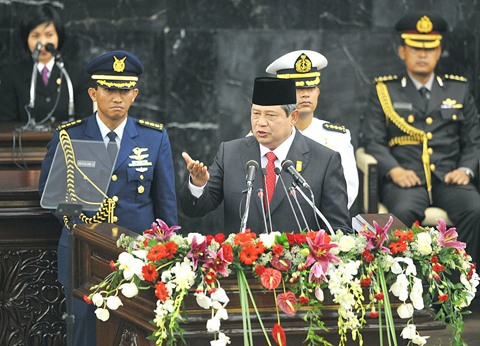Liberal former general Susilo Bambang Yudhoyono was sworn in as Indonesia’s president yesterday after winning a second five-year term with promises of economic growth and political reform.
The softly spoken leader swore on the Koran to uphold the Constitution during a ceremony in the national assembly in Jakarta which was broadcast around the archipelago of 234 million people.
“By Allah I swear I will adhere to the Constitution as faithfully as possible, and will commit myself to the country and the people,” Yudhoyono said.

PHOTO: AFP
A massive security blanket descended on the center of the capital, with about 20,000 police backed by armored vehicles on hand to secure the inauguration.
The event was attended by the leaders of Australia, Brunei, East Timor, Malaysia and Singapore, as well as senior officials from around the world.
Yudhoyono, 60, trounced former president Megawati Sukarnoputri in 2004 to become the mainly Muslim country’s first directly elected head of state since the fall of late military strongman Suharto in 1998.
He did it again in July, easily defeating Democratic Party of Struggle chief Megawati as well as his vice president, the Golkar Party’s Jusuf Kalla, to become the first Indonesian leader to be democratically re-elected.
Cementing his place as the figurehead of the post-Suharto reform era, Yudhoyono’s centrist Democratic Party won the most seats in parliament in April general elections just eight years after it was founded.
He has promised to crack down on corruption, boost infrastructure spending and advance bureaucratic reform.
As the world’s third-largest democracy, Indonesia is also seeking to play a greater role in multilateral forums such as the G20 and global talks on a new climate pact.
The doctor of agricultural studies — who likes to pen romantic ballads in his spare time — has also pledged to steer Southeast Asia’s biggest economy through the global downturn.
“The essence of our program for the next five years is to improve welfare, strengthen democracy and the legal system,” Yudhoyono said. “In the middle of the economic crisis, Indonesia can still grow positively. But we cannot stay idle, as our tasks are far from over.”
“Just like a ship moving forward, we will head through an ocean full of waves and storms,” he said, referring to volatile crude oil prices and stagnant investment.
The government has predicted economic growth of 4 percent to 4.5 percent this year, third only to China and India in the G20 club of rich and major developing countries. The economy grew 6.1 percent last year.

POLITICAL PATRIARCHS: Recent clashes between Thailand and Cambodia are driven by an escalating feud between rival political families, analysts say The dispute over Thailand and Cambodia’s contested border, which dates back more than a century to disagreements over colonial-era maps, has broken into conflict before. However, the most recent clashes, which erupted on Thursday, have been fueled by another factor: a bitter feud between two powerful political patriarchs. Cambodian Senate President and former prime minister Hun Sen, 72, and former Thai prime minister Thaksin Shinawatra, 76, were once such close friends that they reportedly called one another brothers. Hun Sen has, over the years, supported Thaksin’s family during their long-running power struggle with Thailand’s military. Thaksin and his sister Yingluck stayed

In the sweltering streets of Jakarta, buskers carry towering, hollow puppets and pass around a bucket for donations. Now, they fear becoming outlaws. City authorities said they would crack down on use of the sacred ondel-ondel puppets, which can stand as tall as a truck, and they are drafting legislation to remove what they view as a street nuisance. Performances featuring the puppets — originally used by Jakarta’s Betawi people to ward off evil spirits — would be allowed only at set events. The ban could leave many ondel-ondel buskers in Jakarta jobless. “I am confused and anxious. I fear getting raided or even

Kemal Ozdemir looked up at the bare peaks of Mount Cilo in Turkey’s Kurdish majority southeast. “There were glaciers 10 years ago,” he recalled under a cloudless sky. A mountain guide for 15 years, Ozdemir then turned toward the torrent carrying dozens of blocks of ice below a slope covered with grass and rocks — a sign of glacier loss being exacerbated by global warming. “You can see that there are quite a few pieces of glacier in the water right now ... the reason why the waterfalls flow lushly actually shows us how fast the ice is melting,” he said.

Residents across Japan’s Pacific coast yesterday rushed to higher ground as tsunami warnings following a massive earthquake off Russia’s far east resurfaced painful memories and lessons from the devastating 2011 earthquake and nuclear disaster. Television banners flashed “TSUNAMI! EVACUATE!” and similar warnings as most broadcasters cut regular programming to issue warnings and evacuation orders, as tsunami waves approached Japan’s shores. “Do not be glued to the screen. Evacuate now,” a news presenter at public broadcaster NHK shouted. The warnings resurfaced memories of the March 11, 2011, earthquake, when more than 15,000 people died after a magnitude 9 tremor triggered a massive tsunami that